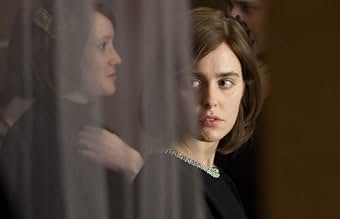AVALIAÇÃO DA IMDb
6,7/10
1,7 mil
SUA AVALIAÇÃO
Adicionar um enredo no seu idiomaIn Félix and Meira, an unusual romance blossoms between two lost souls who inhabit the same neighborhood but vastly different worlds.In Félix and Meira, an unusual romance blossoms between two lost souls who inhabit the same neighborhood but vastly different worlds.In Félix and Meira, an unusual romance blossoms between two lost souls who inhabit the same neighborhood but vastly different worlds.
- Prêmios
- 15 vitórias e 14 indicações no total
- Direção
- Roteiristas
- Elenco e equipe completos
- Produção, bilheteria e muito mais no IMDbPro
Enredo
Você sabia?
- CuriosidadesLuzer Twersky and Melissa Weisz, who play Shulem, the husband, and Ruth, the friend Meira confides in about not wanting to have more children, both are former Hasidic Jews who left the community as young adults. Twersky assisted in translating the script into Yiddish and served as a technical adviser regarding pronunciation, costumes, meals, and the Jewish rituals depicted in the movie.
- Erros de gravaçãoWhen Shulem hits Félix, you can see Meira in the background trying not to giggle. Considering the tensity of the scene and the nature of Meira's character, it's very likely this was unintentional and a break in character.
- ConexõesFeatured in 2016 Canadian Screen Awards (2016)
Avaliação em destaque
Greetings again from the darkness. This movie is filled with quiet and stillness. Maybe moreso than any movie I can recall. With a backdrop of Montreal, New York and Venice, and a theme of forbidden love and self-discovery, the quiet of the actors belie the undercurrent of emotion driving the three leads.
Meira (Hadas Yaron) is a Hasidic Jew living with her husband Shulem (Luzer Twersky) and their toddler daughter within an Orthodox community where women are forbidden from listening to "outside" music, creating art, or even looking men directly in the eye. Their mission in life is to serve their husband, have lots of babies, and respect the religion. While many women in the community seem fine with their lot, Meira hides records under the sofa, draws pictures in a pocket-sized notebook, and longs for the excitement and color of the real world.
One day, by happenstance, the paths of Meira and Felix (Martin Dubreuil) cross in a neighborhood corner store. He compliments her on her drawing, as she tries to ignore him. By the time they next meet, we have witnessed the painful bedside farewell of Felix to his dying father. It's difficult to tell which is the stronger emotion here – guilt or grief.
Soon enough Felix and Meira are finding ways to meet, but there is no crazed display of passion between the two. There is a devastating scene as Felix patiently waits while Meira musters the courage to actually look into his eyes. It's like 50 Shades of Restraint. It turns out, for different reasons, these two lost souls share a common bond of loneliness. Meira's individuality and creativity are stifled by religious oppression, while Felix is coming to grips as the black sheep of a family that no longer exists. When Felix says of his father, "He hated me to death. And then he died.", we understand it's the missed opportunity that weighs on him more than the passing of a long-lost parent.
Music plays a vital role in how director Maxine Giroux presents the characters and the story. Wendy Rene's "After Laughter Comes the Tears" is used beautifully, as is Leonard Cohen's "Famous Blue Raincoat". Heck, even a mousetrap becomes music to the desperate ears of Meira. As stated before, the film is incredibly quiet, and I challenge any movie lover to come up with a more painful argument than the one featuring Meira and Shulem whispering at each other from separate beds, or a more powerful scene with fewer spoken words than Shulem and Felix at the kitchen table. On the bright side, watching her walk around in her first ever pair of jeans is a freeing sight to behold.
Mr. Giroux presents something very real, yet outside the bounds of what cinema usually brings when forbidden love, religion, loneliness and grief are involved. Ms. Yaron delivers an astounding performance, and it's little wonder this has been such a hit on the festival circuit.
Meira (Hadas Yaron) is a Hasidic Jew living with her husband Shulem (Luzer Twersky) and their toddler daughter within an Orthodox community where women are forbidden from listening to "outside" music, creating art, or even looking men directly in the eye. Their mission in life is to serve their husband, have lots of babies, and respect the religion. While many women in the community seem fine with their lot, Meira hides records under the sofa, draws pictures in a pocket-sized notebook, and longs for the excitement and color of the real world.
One day, by happenstance, the paths of Meira and Felix (Martin Dubreuil) cross in a neighborhood corner store. He compliments her on her drawing, as she tries to ignore him. By the time they next meet, we have witnessed the painful bedside farewell of Felix to his dying father. It's difficult to tell which is the stronger emotion here – guilt or grief.
Soon enough Felix and Meira are finding ways to meet, but there is no crazed display of passion between the two. There is a devastating scene as Felix patiently waits while Meira musters the courage to actually look into his eyes. It's like 50 Shades of Restraint. It turns out, for different reasons, these two lost souls share a common bond of loneliness. Meira's individuality and creativity are stifled by religious oppression, while Felix is coming to grips as the black sheep of a family that no longer exists. When Felix says of his father, "He hated me to death. And then he died.", we understand it's the missed opportunity that weighs on him more than the passing of a long-lost parent.
Music plays a vital role in how director Maxine Giroux presents the characters and the story. Wendy Rene's "After Laughter Comes the Tears" is used beautifully, as is Leonard Cohen's "Famous Blue Raincoat". Heck, even a mousetrap becomes music to the desperate ears of Meira. As stated before, the film is incredibly quiet, and I challenge any movie lover to come up with a more painful argument than the one featuring Meira and Shulem whispering at each other from separate beds, or a more powerful scene with fewer spoken words than Shulem and Felix at the kitchen table. On the bright side, watching her walk around in her first ever pair of jeans is a freeing sight to behold.
Mr. Giroux presents something very real, yet outside the bounds of what cinema usually brings when forbidden love, religion, loneliness and grief are involved. Ms. Yaron delivers an astounding performance, and it's little wonder this has been such a hit on the festival circuit.
- ferguson-6
- 20 de mai. de 2015
- Link permanente
Principais escolhas
Faça login para avaliar e ver a lista de recomendações personalizadas
Detalhes
- Data de lançamento
- País de origem
- Central de atendimento oficial
- Idiomas
- Também conhecido como
- Felix and Meira
- Locações de filme
- Empresas de produção
- Consulte mais créditos da empresa na IMDbPro
Bilheteria
- Faturamento bruto nos EUA e Canadá
- US$ 447.353
- Fim de semana de estreia nos EUA e Canadá
- US$ 15.000
- 19 de abr. de 2015
- Faturamento bruto mundial
- US$ 496.714
- Tempo de duração1 hora 45 minutos
- Cor
- Mixagem de som
- Proporção
- 2.35 : 1
Contribua para esta página
Sugerir uma alteração ou adicionar conteúdo ausente






























